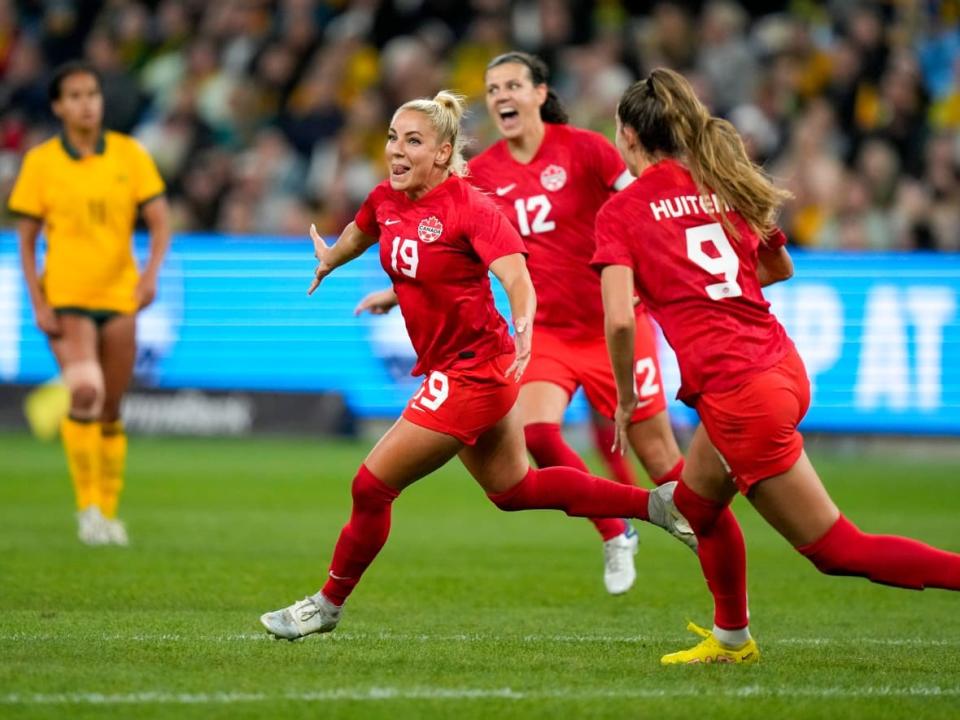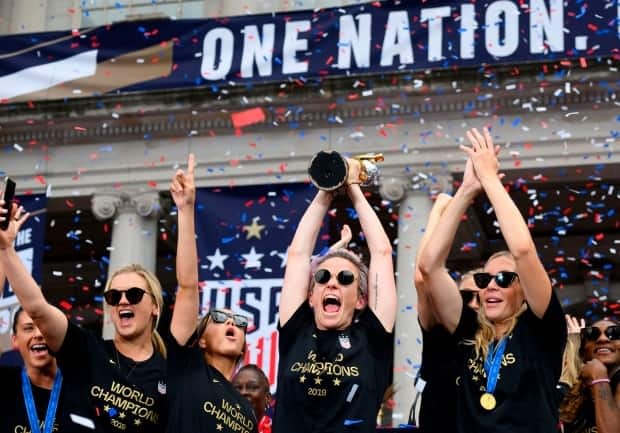Women's World Cup comes at great time to help grow the game even more in Canada

This is a column by Shireen Ahmed, who writes opinion for CBC Sports. For more information about CBC's Opinion section, please see the FAQ.
What can only be described as a riveting Men's World Cup final led us into a new year that will be punctuated again by the beautiful game when Australia and New Zealand co-host the Women's World Cup July 20-Aug. 20.
A lot has happened for the women's game in Canada since the 2019 World Cup, where the team lost in the round of 16 to Sweden. At the Tokyo Olympics two years later, in what is arguably the most important moment in Canadian soccer, the women stood atop the podium as gold medallists. And in December it was announced a new Canadian domestic women's league will launch in 2025.
I am beside myself with excitement about the World Cup, and very happy about Australia and New Zealand's successful bid for the event. The Australian national team (the Matildas) boasts one of the top players in the world in Sam Kerr, and the country is now home to the Afghan women's senior national soccer team, who were evacuated to Australia when the Taliban regime took over in 2021.
Canada is in Group B with the host Aussies, Nigeria and Ireland and at No. 6 is the highest-ranked team among the four, but that doesn't mean the road will be easy. Canada's finishes at the World Cup haven't always been what we hoped, but there's no doubt the team belongs on the sport's biggest stage.
It is perhaps the final World Cup of Christine Sinclair's magnificent career, and will showcase the burgeoning leadership of Jessie Fleming, quiet but with a laser focus like Sincy before her. Canada's team features established global stars like Kadeisha Buchanan, Ashley Lawrence, Jordyn Huitema, and Janine Beckie, all playing for some of the top women's clubs in the world. Kailen Sheridan was voted best goalkeeper of the 2022 NWSL season.
At the helm is coach Bev Priestman, whose tenure has not only been bookmarked by success, but who has helped the team navigate some difficult moments in the women's game. She understands the culture of the team very well.
In the past few years, Soccer Canada and the women's team have had very public tensions. But even these misfires could not prevent the team from skyrocketing in popularity and achievement. As far as the women's team goes, it can be argued they have accomplished so much despite Soccer Canada not supporting them in the ways the players felt they should.
But Canada is not the only country that has been dealing with issues within federations or with players. A few women's players from France were embroiled in a scandal that was, dare I say, Tonya Harding-esque, while les bleues coach Corinne Diacre went tête-à-tête with former national player Amandine Henry over Henry's exclusion from France's Women's Euros team this past summer.
WATCH | Bev Priestman on Soccer North:
The U.S. House of Representatives recently passed the Equal Pay for Team USA Act, which guarantees fair pay between their men's and women's teams. This was many years in the making that saw the women's national team sue the USSF even as they won another World Cup title in 2019. I will never forget the fact confetti thrown during their ticker-tape victory parade in New York City included shredded pages from that lawsuit.
But moments of jubilation also shone brightly. The English men's team may have been unsuccessful in their "it's coming home" campaign in Qatar, but that didn't stop the Lionesses from actually getting it done by winning the 2022 Women's Euros, and they did in front of the 87,192 people, the largest crowd for any Euros match, men's or women's.

Morocco's women's team qualified for their first Women's World Cup and that should be a moment of pride and of inclusion for parts of the women's soccer world that are oft-forgotten. Recently, I reported on how women's soccer is growing in different parts of the world, including the Middle East and North Africa.
Yes, there are many reasons why we are reluctant to support FIFA at face value when it comes to women's soccer (corruption, lack of funding, systemic abuse of players etc.). But the reality is that the women players, their coaches, the support staff, the fans are why it matters to show up and invest in this journey.
I spoke with my daughter, Rumaysa, who is training with the Pakistan women's national football team in Lahore. The team didn't qualify for this year's World Cup, but growing up in Canada and watching the women's team be the "sheroes" she needed in soccer gave my daughter the courage to take a chance to play abroad.
After an exhausting session the other day, she told me over video call that she can't wait for the WWC.
The joy, connection and possibility of the World Cup offer a chance for young girls and boys to see themselves represented at the pinnacle of the beautiful game. It gives them a chance to see women they admire, engaged in the sport they love and be properly lauded for their talents and their commitment. Whether you are in Toronto or Turkmenistan, women's soccer has a place for you.
Soccer may not be the cultural bookmark of Canadian sports, but is certainly an important chapter in the story. And I can't wait to see how it unfolds.

 Yahoo Sports
Yahoo Sports 
